Strictly Personal
Nigerian judges and ASUU by Lasisi Olagunju
Published
2 years agoon

While standing before a judge, any judge, you are a ‘petty man’ even if you are a professor of law. I am not being rude. You shouldn’t have any problem getting my drift if you go back and read William Shakespeare’s Julius Caesar (Act I, Scene II). You meet Cassius telling nobleman Brutus how imperial Julius Caesar is bestriding “the narrow world like a Colossus;” how Brutus and himself are mere “petty men (who) walk under (Caesar’s) huge legs and peep about to find (for themselves) dishonorable graves.” Nothing demeans and devalues a ‘real’ man more than knowing how small he is; very small, cheatable and expendable. When your seed is that disadvantaged, what are you going to do? You struggle and argue with your situation or you surrender to destiny? Cassius has an idea. He tells Brutus the exact thing realists hold against fate: “Men at some time are masters of their fates…the fault…is not in our stars, but in ourselves, that we are underlings.”
There is a way in which career choices limit one’s position in life: Doctor; lawyer; teacher; judge. Judges are very privileged people whose word is law, literally. Teachers, from primary to university, are not that blessed. Even if they are professors, they are hardly seen as authority figures. What we see are colossal dwarfs made by Nigeria to walk under giants of iniquity in search of hope and justice. But why? Let us go back to the above scene in ‘Julius Caesar.’ Cassius asks Brutus to pronounce his name ‘Brutus’ and pronounce ‘Caesar’— and then asks his man what is so special about the emperor’s name that the whole world bows at its mention?: “What should be in that ‘Caesar’? Why should that name be sounded more than yours? Write them together, yours is as fair a name; Sound them, it doth become the mouth as well; Weigh them, it is as heavy; conjure with ’em, ‘Brutus’ will start a spirit as soon as ‘Caesar.'” That is an incitement to envy – even to treason. Or what else do you think it is? Now, let me ask: what is it that is in ‘teacher’ which makes its pronunciation rancid, stale and tasteless?
The last time Nigerian judges had their salaries reviewed was more than a century ago. Their workplace and their personal situation compete with the most appalling in hell. Nigerian public university lecturers and their workplace suffer same fate too, and, because of this, they speak a lot of grammar and have been on strike since February this year. But judges would not go on strike; they cannot. That is what their calling demands of them. They must never be seen saying or doing what ASUU says and does every year. If they ever dream of stopping work, the world will, that day, come to a crashing end. But, because several footpaths lead to the marketplace, impoverished Nigerian judges apparently listened to inciting voices like Cassius’s and possessed their fate. They did self-help – or rather, were helped to prop up their collective destiny by someone who was not even in their confraternity. A senior lawyer went to court – took judges’ predicament to a judge to redress – and it was done. What else is the dictionary definition of self-help? Three months ago (July 2022), Justice Osatohanmwen Obaseki-Osaghae of the National Industrial Court (NIC), Abuja, in a case brought by a lawyer, held that salaries and allowances of judicial officers in the country were embarrassingly low. She, therefore, ordered a new salary structure for the Nigerian judiciary. She commanded the federal government to commence a monthly payment of N10 million salary to the Chief Justice of Nigeria (CJN); N9 million to other justices of the Supreme Court. She ordered that the president of the Court of Appeal should be paid N9 million per month. Every month, N8 million should be the salary of Court of Appeal justices; same for Chief Judges of both federal and state High Courts, President of the National Industrial Court, Grand Khadis and President of Customary Courts, and N7 million to judges of federal and state High Courts.
In making that order, Justice Obaseki-Osaghae noted that salaries of judges and justices had been stagnated for over 14 years. Her words are particularly sweet to hear: “There is no doubt that from evidence adduced before this court, salaries payable to judges as well as their conditions of service, have been greatly altered to their disadvantage…Judicial officers are daily impoverished by the devaluation of the naira. They have suffered financial hardship and embarrassment owing to their poor pay. It is a shame to the country. In spite of this, our judges have continued to carry out their statutory duties. Justices are themselves victims of a great injustice. What an irony,” she quipped. I understand that the decision has been appealed against and it is before My Lords at the Court of Appeal. It will be so nice to hear what the justices will say in this case which is about their own welfare.
I do not understand why our lecturers have not gone to the same industrial court to benefit from the judges’ self-help. Go there; show the court that the facts are similar; ask the judge to follow their own precedent and give your life a breather too. Would the court say no and thus confirm Nigeria as an iniquitous farm where some animals are more equal than the others? Judges are lions who rule with principles and doctrines. And there are very many of these credos of justice. They talk about precedent; stare decisis; apply the law in the same manner when cases are on all fours with each other; attend to cases with similar facts similarly; hit the gavel with the same force when dealing with similar legal issues. University teachers know so much and teach so much. They teach law; they teach logic; they teach economics and psychology and everything a man needs to escape the snares of the fowler. But our knowledgeable university lecturers hardly benefit from their knowledge. If there was an agreement with the government and the government breached that agreement, where else should the cheated go to demand performance of the duties imposed by what they signed? The court is the place to go, not the renegotiation table, ASUU’s favourite solution room. Let the court pronounce the government as the wrong party which must make restitution or be damned. But no. Whenever heaven offers our teachers a rose, they always insist on their ancestral cabbage of undying old habits. They still have not seen the wisdom in grabbing the divine lifeline which the judges’ salary case provides. If I were ASUU, I would ask the goose of the judiciary to do for my gander what it has done for itself. But the court is not a Father Christmas; it gives only to him who demands.
What do you call a person who does not keep his word? Someone asked that question and he got quite interesting answers. One responder said ‘reneger’; another said ‘traitor’; one bad person said ‘politician.’ Nigerian lecturers may be stuck in the last century; their nemesis are very up-to-date and that is because those ones live by breaking covenants. And you must not tell the unfaithful that they are dishonest; the way to get them is by setting the law to get them. That is the wisdom embraced by the judges through a lawyer. That wisdom has eluded the ivory tower.
It is an irony that the deer of the pact-breaking Nigerian government now pursues the hunter of ASUU. Two months after issuing the order for new pay packages for judges, the same National Industrial Court (not the same judge) on 21 September, 2022 ordered “impoverished” striking university teachers to go back to work empty-handed “in the interest of the nation.” Justice Polycarp Hamman made the order while delivering a ruling in an interlocutory injunction motion brought by the Federal Government. The order, according to the judge, was made in line with the provisions of Section 18 of the Trade Dispute Act which empowers the court to make such order in the interest of the nation. Justice Hamman, in ordering the lecturers back to the classroom, held that students had a fundamental right to education which needed to be protected from ASUU’s interminable no-work action. Do not blame the court; it acted on what was brought before it. Where was ASUU before the devil took the initiative of approaching the court first? Dissatisfied ASUU sought a leave of the Court of Appeal to appeal that ruling. It also filed an application for a stay of execution of the trial court’s ruling and then withdrew the application last Friday. The Appeal Court’s response to the applications was a grant of the leave sternly conditioned with an order that the union should, with effect from that moment, obey the order of the Industrial Court by going back to work. ASUU has not obeyed that order of the Court of Appeal. And the order is final.
The Nigerian government and its operatives are lustrous gods of vengeance. They may be lost in the maze of ineptitude but they competently protect their space with uncommon rage and passion. They may have no answer to questions from their victims but they know how to dip ASUU’s stubborn ass in hot water. Almost simultaneous with the legal challenge, two rival unions have been registered to contest the universities with ASUU. But the questions won’t go away: When is this long night of strikes ending? The tragedy that has robbed our children of one whole year of their lives, where is the plot taking us? How many acts are we destined to witness in this ASUU-Government tragedy? The plot lengthens daily with unconventional acts. A perfect Aristotelian tragedy has a character who moves from prosperity to perdition; from grace to grass – there is no road to redemption. Aristotle wrote about desis and lysis (binding and unbinding; complication and denouement) as the acts of a play. Some other critics think the act of drama should have more than just a problem and a resolution. The Nigerian tragedy has catastrophe as the final act of its drama.
A friend reminded me that the strike won’t resolve the issues in the sector even if it lasts till the end of the world. He was insistent that the education sector was not different from all other sectors in Nigeria. I agree. Nigeria is too damaged to be remodeled or repaired by forces locked up in isolated silos. Because we were born as free as their Caesar, we can and should tackle the winter induced by the Nigerian Caesar. We are asking existential questions of Nigeria. ASUU has worked hard, fought and won many battles since its birth. It should now leave its compartment and join in asking those global questions we ask about Nigeria and its future. Medical and environmental historians tell us of the human ancestors who moved north from the warm African heartland almost 24,000 years ago. The ancestors left their zone of comfort and ran into the killing chill of the ice age; they had their existence threatened. Then they used their brain, adapted and “devised rudimentary clothing”, fought off the big freeze and consequently lived to preserve their branch of creation. Nigeria’s current reality is the political version of the ice age. Its inclement sheet kills and it will kill. It will take big brains and a lot of adaptation and maneuvering to survive it.
However this season ends, the trial of ASUU teaches a lesson: The baby sired by the world is what the world carries (omo tí ayé bí ni ayé n pòn). That is an ancestral counsel on pragmatism. Achebe’s “Eneke the bird says that since men have learnt to shoot without missing, he has learnt to fly without perching.” If Eneke had taken his survival lessons from ASUU and had predictably sat on same branch from morning to morning, he would have been long dead.
You may like
-


This Sudan war is too senseless; time we ended it, By Tee Ngugi
-


Air Peace, capitalism and national interest, By Dakuku Peterside
-


This is chaos, not governance, and we must stop it, By Tee Ngugi
-


Off we go again with public shows, humbug and clowning, By Jenerali Uliwengu
-


How patriarchy underpins gender violence today, By Tee Ngugi
-


Help! There’s a dangerous, secret plot to save the EAC from imminent death, By Charles Onyango-Obbo
Strictly Personal
This Sudan war is too senseless; time we ended it, By Tee Ngugi
Published
1 week agoon
April 28, 2024
Why are the Sudanese Armed Forces (SAF) and the paramilitary Rapid Support Forces (RPF) engaged in a vicious struggle? It is not that they have ideological, religious or cultural differences.
Not that people should fight because of these kinds of differences, but we live in a world where social constructions often lead to war and genocide. It is not that either side is fighting to protect democracy. Both sides were instruments of the rapacious dictatorship of Omar el-Bashir, who was overthrown in 2019.
Both are linked to the massacres in Darfur during Bashir’s rule that led to his indictment by the International Criminal Court for crimes against humanity. They both stood by as ordinary, unarmed people took to the streets and forced the removal of the Bashir regime.
None of these entities now fighting to the last Sudanese citizen has any moral authority or constitutional legitimacy to claim power. They both should have been disbanded or fundamentally reformed after the ouster of Bashir.
The SAF and the RSF are fighting to take over power and resources and continue the repression and plunder of the regime they had supported for so long. And, as you can see from news broadcasts, they are both well-versed in violence and plunder.
Since the fighting began in 2023, both sides have been accused of massacres that have left more than 30,000 people dead. Their fighting has displaced close to 10 million people. Their scramble for power has created Sudan’s worst hunger crisis in decades. Millions of refugees have fled into Chad, Ethiopia and South Sudan.
The three countries are dubious places of refuge. Chad is a poor country because of misrule. It also experiences jihadist violence. Ethiopia is still simmering with tensions after a deadly inter-ethnic war.
And South Sudan has never recovered from a deadly ethnic competition for power and resources. African refugees fleeing to countries from which refugees recently fled or continue to flee sums up Africa’s unending crisis of governance.
Africa will continue to suffer these kinds of power struggles, state failure and breakdown of constitutional order until we take strengthening and depersonalising our institutions as a life and death issue. These institutions anchor constitutional order and democratic process.
Strong independent institutions would ensure the continuity of the constitutional order after the president leaves office. As it is, presidents systematically weaken institutions by putting sycophants and incompetent morons in charge. Thus when he leaves office by way of death, ouster or retirement, there is institutional collapse leading to chaos, power struggles and violence. The African Union pretends crises such as the one in Sudan are unfortunate abnormally. However, they are systemic and predictable. Corrupt dictatorships end in chaos and violence.
Tee Ngugi is a Nairobi-based political commentator.
Strictly Personal
Air Peace, capitalism and national interest, By Dakuku Peterside
Published
3 weeks agoon
April 16, 2024
Nigerian corporate influence and that of the West continue to collide. The rationale is straightforward: whereas corporate activity in Europe and America is part of their larger local and foreign policy engagement, privately owned enterprises in Nigeria or commercial interests are not part of Nigeria’s foreign policy ecosystem, neither is there a strong culture of government support for privately owned enterprises’ expansion locally and internationally.
The relationship between Nigerian businesses and foreign policy is important to the national interest. When backing domestic Nigerian companies to compete on a worldwide scale, the government should see it as a lever to drive foreign policy, and national strategic interest, promote trade, enhance national security considerations, and minimize distortion in the domestic market as the foreign airlines were doing, boost GDP, create employment opportunities, and optimize corporate returns for the firms.
Admitted nations do not always interfere directly in their companies’ business and commercial dealings, and there are always exceptions. I can cite two areas of exception: military sales by companies because of their strategic implications and are, therefore, part of foreign and diplomatic policy and processes. The second is where the products or routes of a company have implications for foreign policy. Air Peace falls into the second category in the Lagos – London route.
Two events demonstrate an emerging trend that, if not checked, will disincentivize Nigerian firms from competing in the global marketplace. There are other notable examples, but I am using these two examples because they are very recent and ongoing, and they are typological representations of the need for Nigerian government backing and support for local companies that are playing in a very competitive international market dominated by big foreign companies whose governments are using all forms of foreign policies and diplomacy to support and sustain.
The first is Air Peace. It is the only Nigerian-owned aviation company playing globally and checkmating the dominance of foreign airlines. The most recent advance is the commencement of flights on the Lagos – London route. In Nigeria, foreign airlines are well-established and accustomed to a lack of rivalry, yet a free-market economy depends on the existence of competition. Nigeria has significantly larger airline profits per passenger than other comparable African nations. Insufficient competition has resulted in high ticket costs and poor service quality. It is precisely this jinx that Air Peace is attempting to break.
On March 30, 2024, Air Peace reciprocated the lopsided Bilateral Air Service Agreement, BASA, between Nigeria and the United Kingdom when the local airline began direct flight operations from Lagos to Gatwick Airport in London. This elicited several reactions from foreign airlines backed by their various sovereigns because of their strategic interest. A critical response is the commencement of a price war. Before the Air Peace entry, the price of international flight tickets on the Lagos-London route had soared to as much as N3.5 million for the economy ticket. However, after Air Peace introduced a return economy class ticket priced at N1.2 million, foreign carriers like British Airways, Virgin Atlantic, and Qatar Airways reduced their fares significantly to remain competitive.
In a price war, there is little the government can do. In an open-market competitive situation such as this, our government must not act in a manner that suggests it is antagonistic to foreign players and competitors. There must be an appearance of a level playing field. However, government owes Air Peace protection against foreign competitors backed by their home governments. This is in the overall interest of the Nigerian consumer of goods and services. Competition history in the airspace works where the Consumer Protection Authority in the host country is active. This is almost absent in Nigeria and it is a reason why foreign airlines have been arbitrary in pricing their tickets. Nigerian consumers are often at the mercy of these foreign firms who lack any vista of patriotism and are more inclined to protect the national interest of their governments and countries.
It would not be too much to expect Nigerian companies playing globally to benefit from the protection of the Nigerian government to limit influence peddling by foreign-owned companies. The success of Air Peace should enable a more competitive and sustainable market, allowing domestic players to grow their network and propel Nigeria to the forefront of international aviation.
The second is Proforce, a Nigerian-owned military hardware manufacturing firm active in Rwanda, Chad, Mali, Ghana, Niger, Burkina Faso, and South Sudan. Despite the growing capacity of Proforce in military hardware manufacturing, Nigeria entered two lopsided arrangements with two UAE firms to supply military equipment worth billions of dollars , respectively. Both deals are backed by the UAE government but executed by UAE firms.
These deals on a more extensive web are not unconnected with UAE’s national strategic interest. In pursuit of its strategic national interest, India is pushing Indian firms to supply military equipment to Nigeria. The Nigerian defence equipment market has seen weaker indigenous competitors driven out due to the combination of local manufacturers’ lack of competitive capacity and government patronage of Asian, European, and US firms in the defence equipment manufacturing sector. This is a misnomer and needs to be corrected.
Not only should our government be the primary customer of this firm if its products meet international standards, but it should also support and protect it from the harsh competitive realities of a challenging but strategic market directly linked to our national military procurement ecosystem. The ability to produce military hardware locally is significant to our defence strategy.
This firm and similar companies playing in this strategic defence area must be considered strategic and have a considerable place in Nigeria’s foreign policy calculations. Protecting Nigeria’s interests is the primary reason for our engagement in global diplomacy. The government must deliberately balance national interest with capacity and competence in military hardware purchases. It will not be too much to ask these foreign firms to partner with local companies so we can embed the technology transfer advantages.
Our government must create an environment that enables our local companies to compete globally and ply their trades in various countries. It should be part of the government’s overall economic, strategic growth agenda to identify areas or sectors in which Nigerian companies have a competitive advantage, especially in the sub-region and across Africa and support the companies in these sectors to advance and grow to dominate in the African region with a view to competing globally. Government support in the form of incentives such as competitive grants ,tax credit for consumers ,low-interest capital, patronage, G2G business, operational support, and diplomatic lobbying, amongst others, will alter the competitive landscape. Governments and key government agencies in the west retain the services of lobbying firms in pursuit of its strategic interest.
Nigerian firms’ competitiveness on a global scale can only be enhanced by the support of the Nigerian government. Foreign policy interests should be a key driver of Nigerian trade agreements. How does the Nigerian government support private companies to grow and compete globally? Is it intentionally mapping out growth areas and creating opportunities for Nigerian firms to maximize their potential? Is the government at the domestic level removing bottlenecks and impediments to private company growth, allowing a level playing field for these companies to compete with international companies?
Why is the government patronising foreign firms against local firms if their products are of similar value? Why are Nigerian consumers left to the hands of international companies in some sectors without the government actively supporting the growth of local firms to compete in those sectors? These questions merit honest answers. Nigerian national interest must be the driving factor for our foreign policies, which must cover the private sector, just as is the case with most developed countries. The new global capitalism is not a product of accident or chance; the government has choreographed and shaped it by using foreign policies to support and protect local firms competing globally. Nigeria must learn to do the same to build a strong economy with more jobs.
EDITOR’S PICK


Lack of awareness on Cyber Security Act persists, prompting calls for enhanced sensitization in Kasama
Despite the enactment and implementation of the Cybersecurity Act, a segment of society in Northern Province’s Kasama District remains unaware...


Nigeria not considering permitting foreign military bases— Information Minister
The Nigerian government has denied reports that it is considering permitting the establishment of foreign military bases in the country...
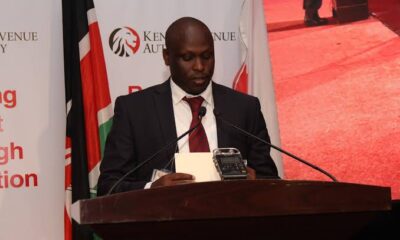

Kenya Revenue Authority partners UK to streamline customs valuation process
The Kenya Revenue Authority (KRA), has struck a partnership with the United Kingdom (UK) to streamline the Customs valuation process...


South African actor dies tragically in car accident
South African actor, Mpho Sebeng, has reportedly died in a ghastly car accident in in Potchefstroom, North West province, his...


Chelsea offers Lukaku plus cash to Napoli for Osimhen
English Premier League club, Chelsea, is said to be willing to offer Belgium striker, Romelu Lukaku, as well as fork...
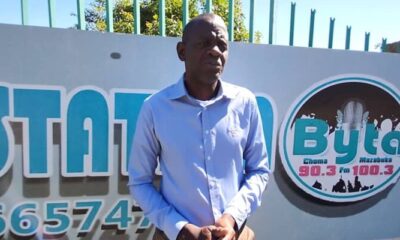

Media manager identifies bureaucratic bottlenecks as hindering access to public information
As discussions on press freedom persist, Albert Mwiinga, Station Manager of Byta FM, sheds light on the hurdles journalists encounter...
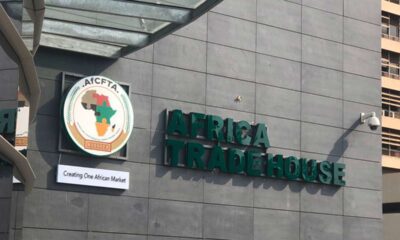

Nigeria: Manufacturers’ market access key to success of AfCFTA agreement
According to the Manufacturers Association of Nigeria (MAN), the ability of local manufacturers to compete on the continent is crucial...
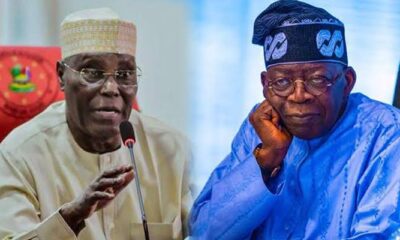

Nigeria: Atiku alleges Tinubu’s son, surrogates on board of firm awarded lucrative coastal highway contract
Former Nigerian Vice President, Atiku Abubakar, has alleged that President Bola Tinubu’s son, Seyi, and his surrogates are on the...
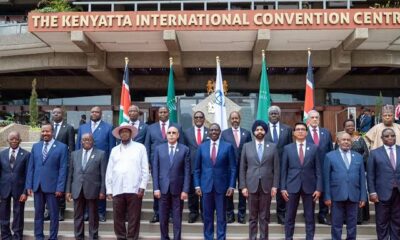

Behind the News: All the backstories to our major news this week
Over the past week, there were many important stories from around the African continent, and we served you some of...


Nigerian retail startup Renda secures $1.9m funding to drive expansion
Nigeria’s retail startup, Renda, has announced securing a $1.9 million pre-seed round of equity and debt funding to enable it...
Trending
-

 Sports22 hours ago
Sports22 hours agoChelsea offers Lukaku plus cash to Napoli for Osimhen
-

 Metro1 day ago
Metro1 day agoNigeria: Atiku alleges Tinubu’s son, surrogates on board of firm awarded lucrative coastal highway contract
-

 VenturesNow1 day ago
VenturesNow1 day agoNigeria: Manufacturers’ market access key to success of AfCFTA agreement
-

 Metro1 day ago
Metro1 day agoMedia manager identifies bureaucratic bottlenecks as hindering access to public information


